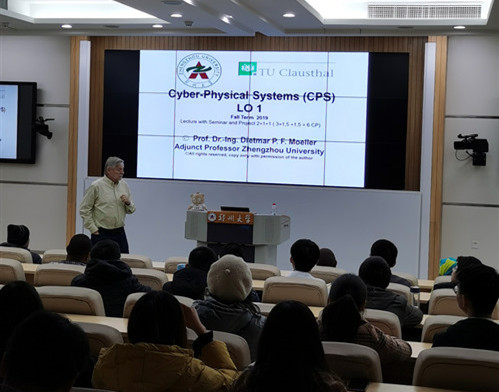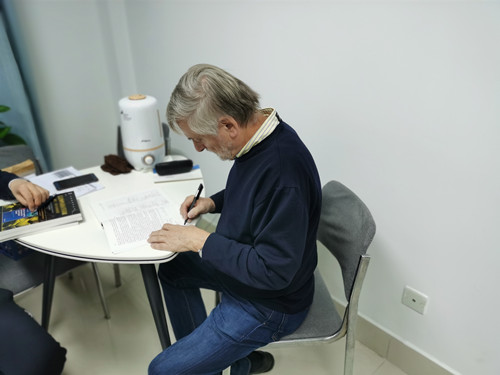德国卡劳斯塔尔工大Prof.Moeller莫勒教授讲授“信息物理CPS系统”
——郑州大学海外名师百门专业课
近日,郑州大学海外名师百门专业课之通信前沿技术—“信息物理CPS系统”邀请到德国克劳斯塔尔工业大学Prof.Moeller莫勒教授来校讲授。本课程也是我校和德国克劳斯塔尔工业大学、德国大众公司、上汽大众郑州公司等共同申请的2019中德政府间智能制造合作试点示范“郑州大学中德智能制造培养基地”人才建设系列课程之一。课程内容广泛,新颖,包括信息物理CPS系统导论、普适计算理论、数字制造-德国工业4.0等内容,对我校相关专业的本科生和研究生开放。

Prof.Moeller莫勒教授讲授“信息物理CPS系统”
CPS (cyber physical systems)信息物理系统,是一个综合计算、网络和物理环境的多维复杂系统,通过3C(Computation、Communication、Control)技术的有机融合与深度协作,实现大型工程系统的实时感知、动态控制和信息服务,是集成计算、通信与控制于一体的下一代智能系统。 CPS与物联网相似的概念,可以实现计算、通信与物理系统的一体化设计,具有重要而广泛的应用前景。
讲课人简介:莫勒教授是德国TU Claustahl工业大学资深教授,ASIM的创始人之一,欧洲仿真学会联合会(EUROSIM)创始人之一,EUROSIM BoD当选成员。Moeller教授拥有美国国际计算机仿真学会成员,并被选为欧洲理事会主席。Moeller教授被邀请担任日本,美国,印度4所大学的兼职教授。其研究项目涉及信息物理系统,网络安全,智能移动,智能城市和德国工业4.0网络架构等,发表论文280多篇,出版12本相关书籍。

Prof.Moeller莫勒教授出版书籍签名
Syllabus course „Cyber-Physical Systems“
Cyber-physical systems (CPS) are engineered systems that are built from, and depend upon, the seamlessintegration of computation, communication and control in physical systems. CPS enables capability, adaptability,scalability, resiliency, safety, security, and usability expanding the horizons of mission critical and crucial systems.In this regard, CPS transforming the way people interacts with engineered systems, just as the Internet hastransformed the way people interact with information. CPS drive innovation and competition in a range of application domains including agriculture, aeronautics, building design, civil infrastructure, energy, environmental quality, healthcare and personalized medicine, manufacturing, and transportation. Moreover, the integration of artificial intelligence with CPS creates new research opportunities with major societal implications. Against this background a serious methodological background is required to understand and apply CPS w.r.t. combining cyber capabilities (computation and communication) with physical capabilities (motion or other physical processes). Hence, cars, aircrafts, ships, trains, robots, and more are prime examples, because they move physically in space in a way that is determined by discrete computerized algorithms. Designing such algorithms to control CPS is challenging with regard to their tight coupling with physical systems behavior. Moreover, it is vital that these algorithms are correct, because user rely on CPS for safety-critical tasks like keeping aircrafts away from colliding as part of a runway incursion. Therefore, the ZZU module CPS abstract from sectors to more general principles and their methodological background and apply these to problems in new sectors such as Industry 4.0.an ongoing merge between individualized production and networked Industry. Hence the topics for this transformation are: introduced in six so called learning objects:
1. Introduction to Systems,
2. Introduction to Embedded Computing Systems
3. Introduction to Cyber-Physical Systems
4. Introduction to the Internet of Things
5. Introduction to Ubiquitous Computing
6. Digital Manufacturing – Industry 4.0